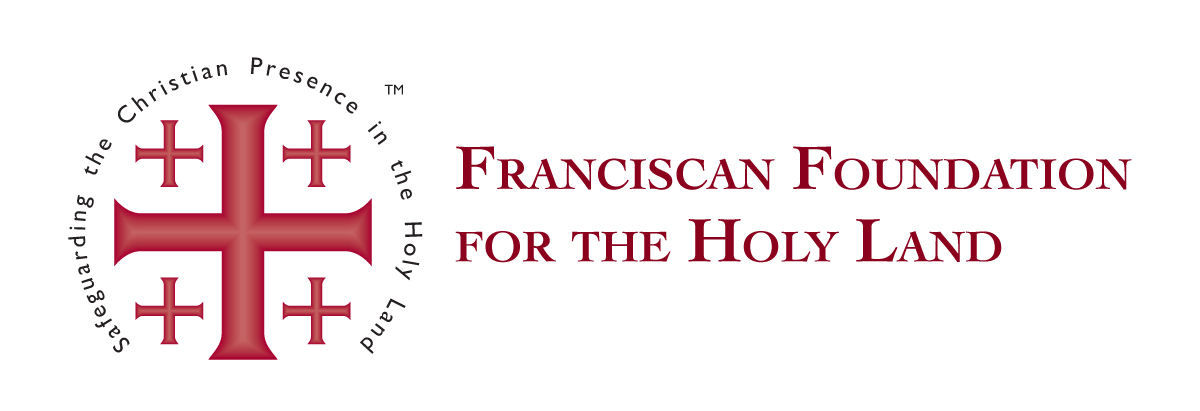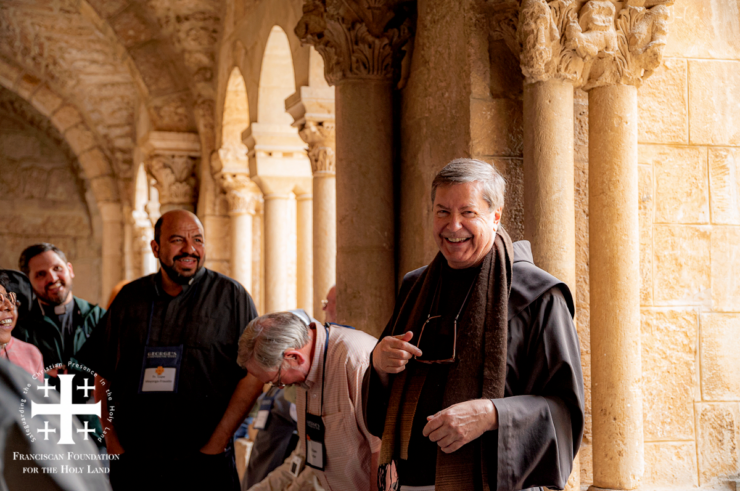Father AlbertoVice Director, Magnificat Institute of Music
Father Peter F. Vasko interviews Fr. Alberto Pari about his past, his present and his years of involvement and leadership with FFHL. Here at FFHL, it is the incredible team combined with the support of our donors that allows us to continue our mission of preserving the Living Stones in the Holy Land. We could not do what we do without leaders like Fr. Alberto.\n\n[cs_element_gap _id=”5″ ][x_image type=”none” src=”10812:full” alt=”” link=”false” href=”#” title=”” target=”” info=”none” info_place=”top” info_trigger=”hover” info_content=””][cs_element_gap _id=”7″ ][cs_element_text _id=”8″ ]Fr. Alberto, tell our readers about yourself, your family background, your vocational story and what additional duties you have been assigned to as a Franciscan friar?
I am Italian. My family lives in the north part of Italy, in Lombardia, near Milano, the closest town is Brescia. I grew up in a Christian family with a simple but strong faith, but I never thought of religious life. At age 27, I felt that something was missing, so I started searching for the answer. I travelled in Europe, and arrived in a very special place called Taizé. There I was welcomed as a volunteer for two years. Living in a Christian community of brothers, I understood I was called to a religious life with an open heart and mind to multicultural and interfaith dialogue. I then discovered the Franciscans of the Holy Land and finally found answers to my research. In the Custody of the Holy Land, I have been responsible for Gregorian singing for several years, and I have been asked to continue studying. I just concluded my second degree in Archaeology and Holy Scriptures. I am also responsible for the Communication office and the ecumenism and interfaith dialogue.
How did you get involved with the Magnificat Institute of Music? Did you have any musical talents before you entered the Franciscan Custody?
Seven years ago I was appointed as Vice Director of the Music School of the Custody, the Magnificat Institute, and a helper for Br. David Grenier, the Director. I studied music when I was a teenager. Flute is my instrument, but I did also sing and play a bit of piano.
Tell us about the Institute: The history, courses and its activities?
The Magnificat Institute was established in 1995 by a decision of the Custodial Chapter of the Franciscan Custody of the Holy Land. The Magnificat has an agreement with the Conservatory of Music “A. Pedrollo” of Vicenza (Italy), whereby the Institute has adopted the programs of the Conservatory. On June 23, 2010, the Conservatory created a foreign branch of the Conservatory abroad in cooperation with the Magnificat Institute, for providing academic level education in specific musical disciplines. Academic classes have been created at the Magnificat in this context. Presently, the school has about 200 students and 28 teachers of different backgrounds, Christians, Muslims and Jews. Three of its students have recently obtained the Academic and Master’s Degrees at the Conservatory of Vicenza; other students have graduated from other international and local universities.
The Magnificat Institute of Music, operating in the Old City of Jerusalem, provides a high academic education and practice in music for the local individuals regardless of their gender, race, language, or religion. In the accomplishment of its mission, the Magnificat Institute offers its students the opportunities to pursue a career in musical professions.
How has the pandemic affected the school? How did you resolve the problem of teacher/student interaction?
Music didn’t stop, even during lockdowns. It has been a very challenging year, but the creativity of our teachers, families and having technology helped a lot. Video lessons were held during the period it was forbidden to meet in person. As soon as it was possible to return to school, music flourished even more than before.
How long are the courses, how many students have graduated since it’s beginning, and how many students are presently attending the Institute?
There are two main programs for our students. It takes years of preparation for the real beginner, starting at age 4 or 5. Five years in the pre-academic program earns a high school diploma in music. There is a three-year academy for the very talented, the University of Music. Only three students have graduated from the Academy and five are currently completing their education. An estimated 50 students have completed their studies at the Magnificat Institute. Before it was possible to conclude academic preparation in Jerusalem, the Magnificat sent its best students to Italy to get their diplomas. Since then, four of them have taught at the Magnificat and three still currently teach here.
What are some of the accomplishments that the Magnificat Institute of Music can be proud of?
Some of our students concluded their studies in music and have become teachers in our Institute, along with other schools in the city. One teaches as an organist in the United States, and others have continued their careers in Europe. We are very proud of one of our best students, Mohammed Alshaikh who is already a pianist of international reward.
How has the Institute contributed in bringing people together in a land filled with many conflicts and difficulties?
Our students and their families have grown and lived together in our Institute for at least 8 or 10 years, experiencing concerts, tournées abroad and daily life at school. Nobody feels judged or uncomfortable with their cultural background or belief, and everybody is welcomed as a member of a huge family – the family of God.
What are the greatest needs that the Magnificat Institute of Music faces today?
For over 26 years, the classes are located in the basement of the convent of St. Saviour in the old city. Although this is a nice place to meet, it is getting small and uncomfortable. There is a very nice project for a new building, but the costs are very high. The school needs new spaces and always some economical help to cover the costs for the families who cannot pay the scholastic fees. We never refuse a talented student because he is unable to cover the costs.


